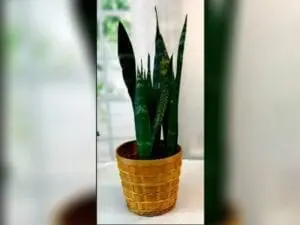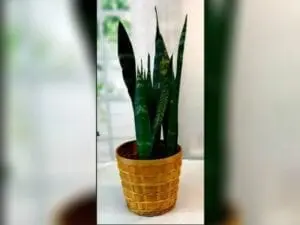Indoor plants: Which plants purify the air in your home?
Nearly everyone loves the beauty houseplants bring into a home or office, but our professionals at Fiesta Flowers, Plants & Gifts know that many of these plants have the benefit of pulling toxins out of the air as well. This quality is especially useful in buildings where windows don’t open and air quality isn’t what it ought to be. With that in mind, here are four plants prized for their ability to keep indoor air clean and healthy.

Nearly everyone loves the beauty houseplants bring into a home or office, but our professionals at Fiesta Flowers, Plants & Gifts know that many of these plants have the benefit of pulling toxins out of the air as well. This quality is especially useful in buildings where windows don’t open and air quality isn’t what it ought to be. With that in mind, here are four plants prized for their ability to keep indoor air clean and healthy.
Snake Plants
Snake plants not only come with air purify talents, but they are just about indestructible. They tolerate bad light, poor soil, and a plant parent who forgets to water them, and they even seem to thrive in these conditions. Nearly everyone is familiar with the sword-shaped green and gold leaves of this plant. Given even a little care, which means indirect light, not too much watering and some light, year-round fertilizing, it will bear spikes of pretty white flowers.

Jade Plant
This attractive plant stores water in its oval-shaped, fleshy leaves and strong stems, so it doesn’t need much watering. Enough water to keep the soil a bit moist should keep a jade plant happy, as well as full sunlight in a southern window. The plant not only cleans the air but grows well in a room that other indoor plants find a bit too cold. Grow a jade plant in a terracotta pot with good drainages in the cactus mix. A well-cared-for jade plant may surprise its owner with masses of fragrant pink flowers just around Christmas.
Spider Plant
This pretty plant with its green and cream-colored stripes on strap-like leaves is an excellent plant for a hanging basket. A specialist in scrubbing the air of formaldehyde, it propagates through “spiderlings” that grow on long, curving stems. These spiderlings can be cut off and put in separate pots.

Like the other plants mentioned, the spider plant can tolerate neglect but will flourish in bright, indirect light and well-draining soil. Like the jade plant, the spider plant tolerates chilly room temperatures better than many other home plants.
Bromeliads
Bromeliads are sometimes mistaken for snake plants, but they’re not closely related. Bromeliads are cousins of the pineapple and, if well cared for, a bromeliad brings forth spectacular, brilliantly colored flowers that last for months. Unfortunately, the plant dies after this, but a healthy bromeliad produces “pups” that can be put in their own pots. The plant’s air-purifying capacities have even been tested by NASA, and it turns out bromeliads are very good at pulling volatile organic compounds such as tetrachloroethylene and formaldehyde out of the air.
Bromeliads need to be planted in well-draining soil, and the little cups formed by the stiff leaves should be filled with water. Bromeliads also need to be misted fairly regularly. They come in a variety of species and need different intensities of light, but if the owner doesn’t know the species of plant it’s just a good idea to put them in bright but not direct sun.

